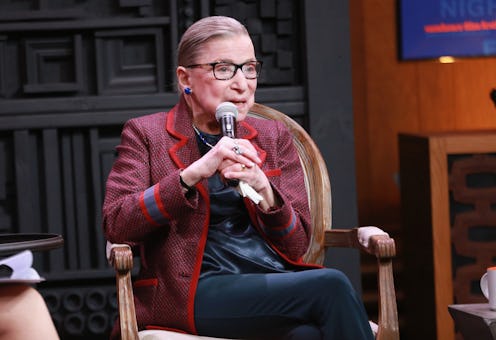News
RBG Said This Case Could Be SCOTUS’ Next Chance To Confront LGBT Discrimination

When the Supreme Court handed down its 7-2 ruling in Masterpiece Cakeshop v. Colorado Civil Rights Commission earlier this year, Justice Ruth Bader Ginsburg made it clear in her dissent that she strongly disagreed with the court's decision to rule in favor of a baker who, citing religious beliefs, refused to make a cake for a same-sex couple. But while giving her annual review of the Supreme Court's most recent session at a Duke Law School program last week, Ginsberg appeared hopeful the court would be given another opportunity to weigh in on the issue of religious-based discrimination against same-sex couples. In fact, Ginsburg pointed to one case in particular, which is currently working its way through a lower court, as potentially being the Supreme Court's next best chance to address gay rights and religious freedom.
"There will be another opportunity," Ginsberg said in an Aug. 1 interview with Duke Law Professor Neil S. Siegel that immediately followed her speech at the Duke D.C. Summer Institute in Washington. "After the Masterpiece Cakeshop case came down, we remanded another case, the case of a florist who refused to supply flowers for same-sex weddings. That case doesn't have anything like what was present in the Colorado case; that is, the suspicion that two of the commissioners were hostile to religion. There's none of that in the florist case. So we will see."
In June, the Supreme Court vacated a ruling from the Washington Supreme Court in the case of Arlene's Flowers v. State of Washington, No. 17-108, ordering the lower court to revisit the case in light of SCOTUS' ruling in the Masterpiece Cakeshop case. The Washington Supreme Court had initially ruled against a florist who refused to provide flowers for a same-sex couple's wedding in 2013 on the grounds doing so would violate her religious beliefs. According to NBC News, the couple had been longtime customers of the florists up until her refusal to work their wedding.
In their ruling, the Washington Supreme Court claimed the florist had violated the state's anti-discrimination law by refusing service to someone on the basis of their sexual identity. "This case is no more about access to flowers than civil rights cases in the 1960s were about access to sandwiches," The New York Times reported the court said in their ruling while quoting from a brief of the plaintiffs.
However, as Ginsburg noted while at the Duke Law event, there's a key difference between the Masterpiece Cakeshop case and the florist's case in Washington state. In Masterpiece Cakeshop, the Supreme Court issued a narrow ruling in favor of the baker on the grounds some members of Colorado's Civil Rights Commission were hostile to religion. The florist's case in Washington is not believed to contain such an element of religious hostility.
"Now it's back in, I think the state of Washington Supreme Court, and we will have another opportunity," Ginsburg said Wednesday. Indeed, although the Supreme Court opted to return the ruling back to the lower court rather than hear arguments for it, the case is expected to come up before the Supreme Court again next session.